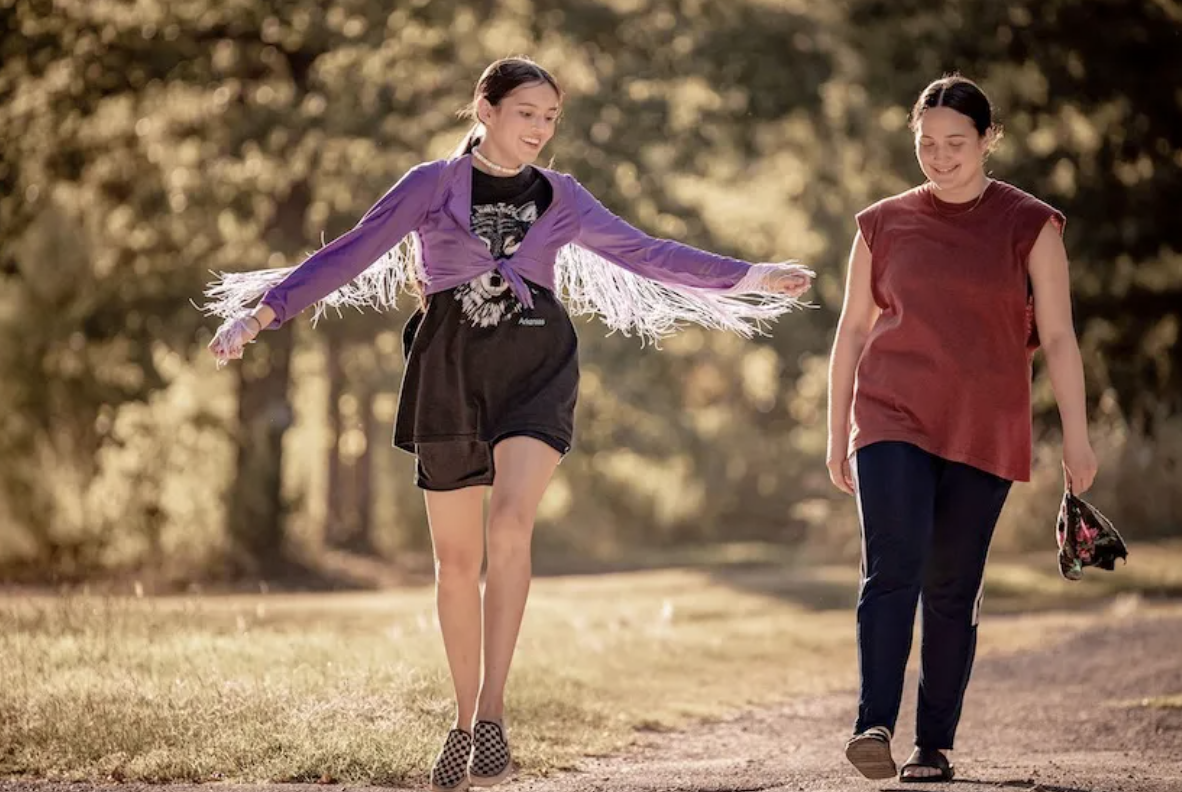
- Details
- By Native News Online Staff
Oscar-nominated Lily Gladstone is once again on the movie screen, this time in the recent film Fancy Dance, now streaming on Apple Tv+.
In the 90-minute film created by Erica Tremblay (Seneca-Cayuga), Gladstone plays Jax, a queer Native woman living on the Seneca–Cayuga Nation Reservation in Oklahoma. In the wake of her sister’s disappearance, Jax is tasked with caring for her niece Roki (Isabel Deroy-Olson), while also fighting to keep her in custody. The film deals with themes of Missing and Murdered Indigenous Women, the Indian Child Welfare Act, and tribal sovereignty.
Lily
“What begins as a search gradually turns into a far deeper investigation into the complexities and contradictions of Indigenous women moving through a colonized world while at the mercy of a failed justice system,” Apple said about the film in a statement.
Fancy Dance originally premiered at the 2023 Sundance Film Festival. For more than a year, the film remained undisturbed until Apple purchased it in February. It played in limited theaters at the end of June, and is now available for streaming on Apple TV+, as of June 28.
In March, Native News Online spoke with Gladstone ahead of the Oscars. She had earned an Oscar nomination for Best Actress as Mollie Burkhart in Martin Scorsese's “Killers of the Flower Moon,” a film that follows a stoic Osage woman from the 1920s whose relatives were murdered by her white husband (Leonardo Decaprio) in pursuit of oil wealth.
The irony: a century after the FBI was created to save Native lives and investigate a string of murders on the Osage Nation, Indigenous people go missing or are murdered more than any other race in the country. The FBI, the agency responsible for investigating many of the crimes in Indian Country, has done little to stop the crisis.
Gladstone likened the plot of Fancy Dance to a modern-day Killers of the Flower Moon.
“It really is kind of incredible how much those (Fancy Dance and Killers of the Flower Moon) need to be seen together,” Gladstone told Native News Online in March. “Because it's the same issues 100 years later, on the same land. Time changes, but these systemic issues remain.”
In February, Native News Online interviewed Tremblay about her work creating Fancy Dance, a film that was written and shot in Oklahoma on Cherokee land.
“We made the film with so many incredible Indigenous and Oklahoma crew members, and to get to make the film with my friends and collaborators is such a dream,” she said. “I'm just hoping that it reaches as many Native American living rooms as possible.”
More Stories Like This
What Inspires Indigenous Ballet Dancer Jock SotoGrand Rapids Public Museum Hosts Indigenous Culture Celebrations
In Case You Missed It: Native Bidaské - Julian Brave NoiseCat on His New Book “We Survived the Night”
Santa Ynez Band of Chumash Indians to Host 19th Annual Culture Day on October 18
Cherokee Nation Collaborates with DreamWorks and NBCUniversal to Bring Cherokee-Language Dub of How to Train Your Dragon
Help us tell the stories that could save Native languages and food traditions
At a critical moment for Indian Country, Native News Online is embarking on our most ambitious reporting project yet: "Cultivating Culture," a three-year investigation into two forces shaping Native community survival—food sovereignty and language revitalization.
The devastating impact of COVID-19 accelerated the loss of Native elders and with them, irreplaceable cultural knowledge. Yet across tribal communities, innovative leaders are fighting back, reclaiming traditional food systems and breathing new life into Native languages. These aren't just cultural preservation efforts—they're powerful pathways to community health, healing, and resilience.
Our dedicated reporting team will spend three years documenting these stories through on-the-ground reporting in 18 tribal communities, producing over 200 in-depth stories, 18 podcast episodes, and multimedia content that amplifies Indigenous voices. We'll show policymakers, funders, and allies how cultural restoration directly impacts physical and mental wellness while celebrating successful models of sovereignty and self-determination.
This isn't corporate media parachuting into Indian Country for a quick story. This is sustained, relationship-based journalism by Native reporters who understand these communities. It's "Warrior Journalism"—fearless reporting that serves the 5.5 million readers who depend on us for news that mainstream media often ignores.
We need your help right now. While we've secured partial funding, we're still $450,000 short of our three-year budget. Our immediate goal is $25,000 this month to keep this critical work moving forward—funding reporter salaries, travel to remote communities, photography, and the deep reporting these stories deserve.
Every dollar directly supports Indigenous journalists telling Indigenous stories. Whether it's $5 or $50, your contribution ensures these vital narratives of resilience, innovation, and hope don't disappear into silence.
 The stakes couldn't be higher. Native languages are being lost at an alarming rate. Food insecurity plagues many tribal communities. But solutions are emerging, and these stories need to be told.
The stakes couldn't be higher. Native languages are being lost at an alarming rate. Food insecurity plagues many tribal communities. But solutions are emerging, and these stories need to be told.
Support independent Native journalism. Fund the stories that matter.
Levi Rickert (Potawatomi), Editor & Publisher

